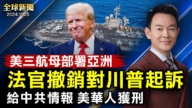【新唐人2012年4月14日讯】中国和菲律宾舰船在南海的对峙,13号,已经进入第四天,这被认为是多年来两国之间最严重的海上对峙。但种种迹象显示,两国都试图避免事件演变成一场军事冲突,但两国都互相警告说,为了保护对这些岛屿的主权,会进一步采取行动。
自4月8号开始,菲律宾海军以国际法所规定的200海里专属经济区为依据,试图扣押在黄岩岛海域捕鱼的中国渔民,但遭到中国两艘海监船的阻拦。12号,中国又派出第三艘海监船到黄岩岛海域。
政论家伍凡:“ 从民国时期算起,已经把南海从台湾岛一直到最南边曾母暗沙、南沙全岛最南端这一大块都化为中国的邻海,那是从蒋介石时代就已经宣布了。中共的政权呢,他们是大陆主义,对海洋从来不重视,也没有力量去重视,一直就是搞内斗。”
伍凡指出,黄岩岛虽然靠近菲律宾, 1936年中华民国就宣布这个岛是中国的,但中共已经损失了很多这样的小岛。现在中菲争的不仅是这个小岛,更主要的是海底的石油。
中国的《国际先驱导报》09年报导,在中国300万平方公里的主权海域中,实际控制的不到一半,中国的海洋资源更是遭到了周边国家的大肆掠夺。
不过,中菲都在试图化解危机:菲律宾把最初派出的最大一艘军舰改为护卫舰,中国也将现场的三艘海监船减少到两艘。《华尔街日报》消息指出,目前双方虽然还在对峙,但外交谈判取得了进展,中菲两国同意撤回他们在这个问题上的外交抗议。
而《环球时报》的语气却有不同,《环球时报》扬言:如果菲律宾和越南两国想打一场海上战争,请他们打第一枪,中国一定会坚决奉陪,送给他们一个不能动“同中国打仗念头”的沉痛教训。
伍凡表示,《环球时报》的论调反映了一部分民意。目前,如果这三艘船先撤走了,中国人一定骂死这个中共政权,说:天天就会镇压老百姓,保护不了自己的领土、领海。伍凡还说,国际上,人家也瞧不起,会认为这么大的国家,对菲律宾都守不住自己领海,你中共还管理什么国家啊?
伍凡希望中共政府不要再退缩,保护好渔民和国土。
伍凡:“长期的僵持下去对中国有利。共产党倒了以后,这个地方还会发生争执。作为中国,无论是哪个政府都应该保护自己的领土、邻海、小岛。”
不过,在中菲对峙时刻,美国和菲律宾开始联合军演,其中包括在南中国海的军事演习。菲律宾此前还得到了美国政府支持的承诺。
“美国安全中心亚太安全计划”的高级主管派翠克.克罗宁对《美国之音》表示,这些承诺意味着,如果菲律宾由于领土争端而与中国发生冲突的话,美国确实会来协防他们。
时事评论员文昭指出,鉴于目前中国国内的政治和经济形势,不允许用战争来解决同邻国的领土主权纠纷,而且南海现在已经国际化了,使战争的可能性更小。
文昭:“通过军事手段解决南海时机已经丧失了,这地方已经是世界各个大国共同关注的一个地区性议题,所以说某个国家单方面用武力去解决会遭致非常严重的政治后果。这个成本太高,已变得不可承受了,按军事解决的可能性已经不存在了。”
但《美国之音》分析说,即使这场冲突可以避免,也会进一步加剧亚洲国家的两极分化,部分国家跟中国靠得更近,另一部分更靠近美国。这对亚太地区的安全将会产生影响。
采访/朱智善 编辑/宋风 后制/君卓
======================
Confrontation between China and Philippines causes tension
in South China Sea
The ship altercation between China and Philippines in the
South China Sea, on April 13th, has entered the fourth day.
This is considered a sea confrontation between the two
countries over the years.
There are signs that both of them are trying to avoid
a military conflict.
But the two countries warned each other, in order to protect the
sovereignty over these islands, they will take further actions.
Since April 8th, the Philippine Navy took the 200 nautical mile
exclusive economic zone under international law as a base line,
Then they tried to seize Chinese fishermen who fished in the
waters off Huangyan Island.
But two Chinese ocean surveillance ships blocked them.
On April 12th, China sent a third ocean surveillance ship to the
waters of the Huangyan Island.
Wu Fan, political commentator: “From the beginning of the
Republic of China, the South China Sea from Taiwan to the
most south of James Shoal, (Nansha island-wide’s southern-
most tip), has been designated as China’s adjacent sea.
It is since the era of Chiang Kai-shek that this was announced.
The regime of Chinese Communist Party (CCP) is the power
of the mainland. They never pay attention to marine issues.
They also have no strength to pay attention either. They have
always been engaged in infighting."
Wu Fan pointed out that although Huangyan Island is near the
Philippines, the Republic of China declared in 1936 that the
island belongs to them. But the CCP has lost many such islands.
Now China and Philippines dispute not only the island, but
more importantly rights to the oil in the sea bed.
“International Herald Tribune” reported in 2009 that among the
three million square kilometers of Chinese sovereign waters,
those actually controlled by China are less than half. China’s
marine resources were plundered by neighboring countries.
However, China and Philippine sare trying to defuse the crisis.
Philippines sent a frigate, instead of the initial biggest warship.
China also reduced the ocean surveillance ships on-site from
three to two.
The Wall Street Journal pointed out that though the two sides
still have a confrontation, diplomatic negotiations have made progress.
Both countries have agreed to withdraw their
diplomatic protests on this issue.
But “Global Times” has a different tone. “Global Times”
threatened: If Philippines and Vietnam want to fight a war at sea,
please fire the first shot. And China will resolutely fight
and give them a painful lesson that they won’t expect.
Wu Fan said, the argument of “Global Times" reflects part of
Currently, if the three ships withdraw first, Chinese people
will strongly blame the CCP regime.
He said: “the CCP just crushes its people, not protecting its
own rights in territorial waters.”
Wu Fan also said that in the international arena, foreigners
will look down on China.
They would think that such a large country could not protect
its own territorial waters against the Philippines.
In that case how can the CCP manage the country?
Wu Fan hopes the CCP will not retreat, and protect fishermen
and its territory.
Wu Fan: Long-term stalemate is a benefit for China. After
the collapse of the CCP, this place will still have a dispute.
The Government of China should protect the territory,
territorial sea and islands no matter what kind it is.
About the time of the confrontation between China and the
Philippines, the U.S. and Philippines began joint military exercises,
including in south of China’s territorial sea, gaining
promise of U.S. government’s support beforehand.
Patrick Cronin, senior executive of Asia-pacific Security Plan
of the U.S. Security Center told Voice of America that promise
means if Philippines conflicts with China due to the territory
dispute, the U.S. surely defend Philippines.
Wen Zhao (news commentator) pointed out given China’s
domestic, political and economic situation, using war to solve
the territorial dispute is prohibited. The problem of the south
sea is international which implies a lesser possibility of war.
Wen Zhao: “Timing for using war to solve the south sea event
is over. Great powers in the world are all focus on the issue of this place,
thus it will cause severe political impact if some
country uses war to solve the problem.
The possibility of war to solve the problem has disappeared
because the cost of war is too high to bear”.
However, Voice of America analyses that even if the war can
be avoided, it will intensify the polarization of Asia countries.
Some countries are getting close to China and others close to
the U.S. It will affect the security of the Asian-Pacific region.




























